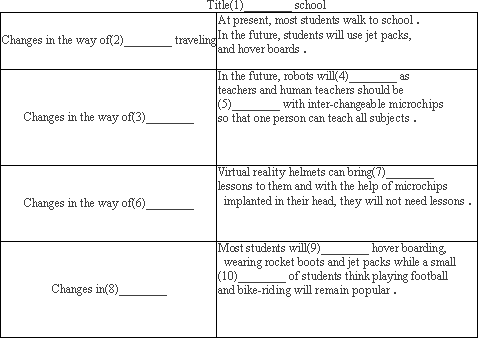
题目列表(包括答案和解析)
根据对话内容,从对话后的选项中选出能填入空白处的最佳选项.选项中有两项为多余选项.
—Good afternoon, sir.
—Good afternoon.
— 1 . I'm Li Fang, the attendant here.
— 2 . My name is Sandy Smith, from Canada.
—Oh, here comes the manger. Mr. Smith. May I have the pleasure to introduce him to you? 3 This is Mr. Smith.
—How do you do.
— 4 ?
—Pleased to meet you. When did you come to Beijing?
—Last week.
—What's your first impression of Beijing?
—Oh, I can hardly put it into words. I really enjoy this city.
— 5 . I hope you'll have a good time during your stay in our hotel. We are very pleased to be able to do anything for you.
—Thank you.
A. How are you
B. It's very kind of you to say so
C. Let me tell you my name
D. Nice to see you
E. Let me introduce myself
F. How do you do
G. This is Mr. Wang, manager of our department.
根据对话内容,从对话后的选项中选出能填入空白处的最佳选项.选项中有两项为多余选项.
A:Would you please read this letter of application (申请) I've just written? 1
B:Oh, let me have a look. 2 But I have one suggestion.
A:Good! What's that?
B:If I were you, I'd change the beginning. 3
A:Good idea, and , what do you think about the second part?
B:Since you've asked me, I think it's too short. You should write much more information about your work experience.
A: 4 I'll change it. How do you feel about the last part of the letter?
B:It's OK. 5
A:I agree. I really appreciate your help. Do you think the end is all right?
B:Oh, yes.
A..I suppose you're right.
B.You should write about your education first.
C.It looks fine to me.
D.I'd like to have your advice.
E.But you should say something about your family, too.
F.That's what I want to say.
G.What will you say about is?
请认真阅读下面短文,并根据所读内容在文章后图表中的空格里填入最恰当的单词。
注意:每空只填一个单词。
Bored at school now? How do you think it will look in the future? Last week, about 600 teenagers in the U.S.imagined a future changed by technology in which their lessons are taught by robots and they learn about celebrities(
名人)and alien(外星人)languages.According to a survey published last week by the U.S.,Internet service provider American Online(AOL), only one in 100 thinks that in the future they will walk from home to school; the rest believe they will use jet packs, and hover boards(
滑板)as everyday transport.All the participants(
参与者)of the survey are teenagers born into the Internet age.The study is to show how the first cyber(网络的)generation dream about a future life created by advanced technology.Most believe there will still be schools to go to, but that technology will play an increasingly important role in learning.The 600 teens surveyed think there will still be teachers, but 37 percent imagine them to be robots.Some 24 percent believe that teachers will still be human but they will have inter-changeable microchips so that one person can teach all subjects.
More than one in two believe hover boarding will be popular, while one-third say that wearing rocket boots will be their favorite activity.Another third think jet packs will be popular.Nearly 30 percent think playing football and bike-riding will remain popular.
When it comes to the curriculum(
课程), they think future generations will be learning about robot building(63 percent), alien languages(47 percent)celebrities(26 percent)and R’n’B music(22 percent).Children will wear virtual(
虚拟的)reality helmets(头盔)to bring lessons to life, say 40 percent, while over 20 percent believe they will not need lessons because microchips implanted(植入)in their head will send relevant information into the brain.Matt Whyman, adviser to the chief medical officer on youth issues of AOL, said:“ The kids seem very aware of the liberation qualities of technology.”
| |||||||||||||||||||||||||||||||||||||||||||||||||||||||||||||||||||||||||||||||||||||||||||||||||||||||||||||||||||||||||||||||||||||||||||||||||||||||||||||||||||||||||||||||||||||||||||||||||||||||||||||||||||||||||||||||||||||||||||||||||||||||||||||||||||||||||||||||||||||||||||
请认真阅读下面短文,并根据所读内容在文章后图表中的空格里填入最恰当的单词。
注意:每空只填一个单词。
Bored at school now? How do you think it will look in the future? Last week, about 600 teenagers in the U.S.imagined a future changed by technology in which their lessons are taught by robots and they learn about celebrities(名人)and alien(外星人)languages.
According to a survey published last week by the U.S.,Internet service provider American Online(AOL), only one in 100 thinks that in the future they will walk from home to school; the rest believe they will use jet packs, and hover boards(滑板)as everyday transport.
All the participants(参与者)of the survey are teenagers born into the Internet age.The study is to show how the first cyber(网络的)generation dream about a future life created by advanced technology.
Most believe there will still be schools to go to, but that technology will play an increasingly important role in learning.The 600 teens surveyed think there will still be teachers, but 37 percent imagine them to be robots.Some 24 percent believe that teachers will still be human but they will have inter-changeable microchips so that one person can teach all subjects.
More than one in two believe hover boarding will be popular, while one-third say that wearing rocket boots will be their favorite activity.Another third think jet packs will be popular.Nearly 30 percent think playing football and bike-riding will remain popular.
When it comes to the curriculum(课程), they think future generations will be learning about robot building(63 percent), alien languages(47 percent)celebrities(26 percent)and R’n’B music(22 percent).
Children will wear virtual(虚拟的)reality helmets(头盔)to bring lessons to life, say 40 percent, while over 20 percent believe they will not need lessons because microchips implanted(植入)in their head will send relevant information into the brain.Matt Whyman, adviser to the chief medical officer on youth issues of AOL, said:“ The kids seem very aware of the liberation qualities of technology.”

湖北省互联网违法和不良信息举报平台 | 网上有害信息举报专区 | 电信诈骗举报专区 | 涉历史虚无主义有害信息举报专区 | 涉企侵权举报专区
违法和不良信息举报电话:027-86699610 举报邮箱:58377363@163.com